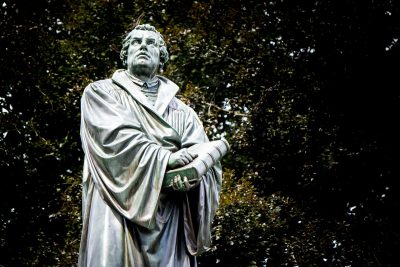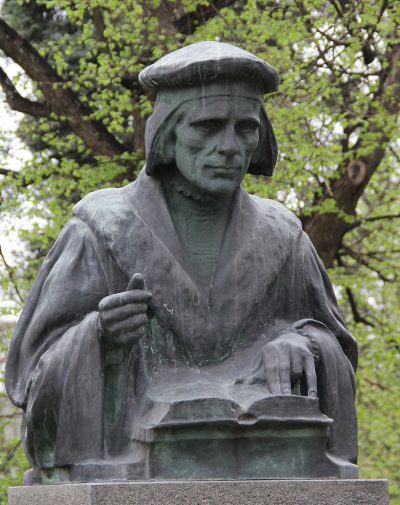What we believe
The catechism is a spiritual handbook that states briefly and clearly what we believe. The catechism is based on the Bible and teaches us how to live with faith in God and with love toward our neighbours.
The ten commandments, the creed and the Lord’s prayer are at the core of the catechism. In addition, it describes the two sacraments, baptism and holy communion.
The ten commandments give us basic instructions on what to do, and what not to do. The creed describes God, what He has done for us and what he promises us. The Lord’s prayer gives us guidance on how we should pray to God so that we would live according to his will. The sacrament of baptism is the foundation of our spiritual lives. The sacrament of the Holy communion strengthens us in our faith.
God’s grace is central to Lutheran theology.
For further information on Lutheran theology, please go to the web site for the Evangelical Lutheran Church in Canada
Also see “What Lutherans believe”
Lutheran churches
According to the Evangelical Lutheran Church, the Lutherans are one of the largest Christian groups in the world, yet there aren’t very many Lutherans in Canada.
Most of the Lutherans (some 200,000 of us) live in the major cities, in southwestern Ontario, in communities in the prairie provinces and in Nova Scotia. Many of the Lutheran congregations in Canada were founded by immigrants, mostly from the Nordic countries Finland, Sweden, Norway, Iceland and Denmark or from Germany, Estonia, Latvia, Lithuania. However today, the congregations are reaching out to others and many of these congregations provide services in English. Some Lutheran congregations also provide services in Spanish, Chinese dialects, Vietnamese or French.
It is important to remember that Martin Luther did not want to start a denomination. He was trying to reform the Catholic church. As Lutherans, we base our beliefs on the truths Martin Luther discovered in the New Testament of the Bible. He discovered that God loves each one of us, not because we have earned His love, but by grace alone.
For more information on Lutheran churches, please visit the Evangelical Lutheran Church in Canada:
http://elcic.ca/What-We-Believe/We-Lutherans.cfm

Also visit:
Lutheran World Organization: https://www.lutheranworld.org/
Evangelical Lutheran church of Finland/Suomen Ev.Lut.Kirkko https://evl.fi/etusivu

Martin Luther
The Lutheran church is a Christian church that emerged from the reformation movement started by Martin Luther in the early 1500’s.
Martin Luther was born in Eisleben, Germany. He studied theology, earned a doctorate and was appointed professor of the Bible at the University of Wittenberg in 1512. He was a Catholic priest and an Augustinian monk.
Like many of his contemporaries, he feared a vengeful God, a God that had to be pleased by earning his acceptance. This is how the medieval church understood God. As Luther studied and taught, he started to realize that the New Testament part of the Bible teaches that God accepts people freely. God’s grace cannot, and does not need to be earned through good deeds. This discovery became his doctrine of “justification by grace through faith”.
The letters of Paul in the New Testament helped Martin Luther understand that salvation is a gift freely given to all who are baptized and who believe in Christ Jesus. Good deeds are a consequence of grace, not a condition for it. These ideas became key principles of the reformation.
Luther demanded that the Bible be available in the language of the people, so ordinary people can read the word of God. He himself translated the Bible into German. He wrote hymns, a catechism, which is a book about the Christian faith, and other books. He also insisted that worship services need to be held in the languages of the people, not only in Latin, as had been the custom at the time.
For further information on Martin Luther, please see the site of the Evangelical Lutheran Church in Canada
 Mikael Agricola
Mikael Agricola
Mikael Agricola was born around 1510 in Pernå (Pernaja), southern Finland as Mikael Olavinpoika. At an early age, he showed gifts as a scholar and a linguist. He was sent to school in Vyborg, and while there, as was customary at the time, assumed a Latin surname, Agricola, to describe his father’s status.
In Vyborg he was introduced to the reformation, as Count Johann who ruled the castle of Vyborg was a supporter of the reformation, having been introduced to it by Gustav Vasa, the king of Sweden while working for him.
Later in Turku, Finland, Agricola met Petrus Särkilahti, Martin Luther’s first Finnish student, who eagerly spread the ideas of the reformation. Upon the death of Särkilahti in 1529, Agricola became his successor and was sent by the bishop of Turku to study in Wittenberg, Germany. He was ordained to priesthood around 1531.
In Wittenberg, Agricola studied under Philipp Melanchton and Martin Luther. Both of these reformists recommended him and he was awarded a stipend from Gustav Vasa. Translating the Bible into the language of the people was a major principle for the reformation, and in 1537, Agricola started to translate the New Testament into Finnish.
However, at the time, there was no standard written form of the Finnish language, so he started to develop it. His first books were an ABC book and a catechism (1543), then a prayer book (1544). Agricola’s most important accomplishment was the translation and publication of the New Testament in Finnish (1548). As a result of these accomplishments, he is considered the father of the Finnish language.
In 1584, Mikael Agricola was consecrated as the bishop of the cathedral parish of Turku, becoming the first Lutheran bishop for all of Finland. He died in 1557 while returning from Russia, where he had helped negotiate a peace agreement, the Treaty of Novgorod.
In naming our congregation after this Lutheran reformist and father of the Finnish language, the founders of Agricola Lutheran Church wanted to honour their heritage.
References:
Mikael Agricola. https://en.wikipedia.org/wiki/Mikael_Agricola
Mikael Agricola, bishop of Turku. http://justus.anglican.org/resources/bio/135.html






